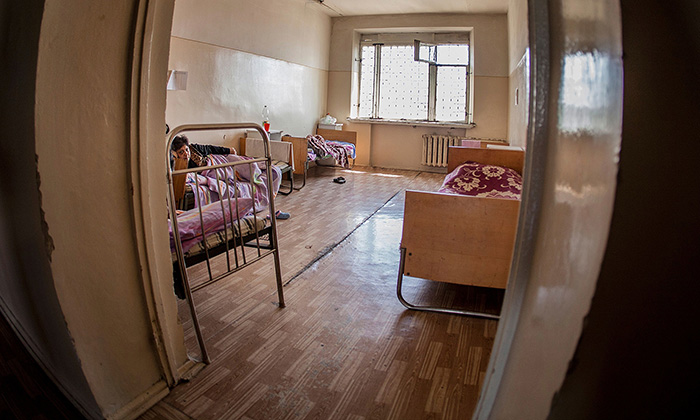How normal people go insane in Armenia - The Guardian

The 54-year-old says she was taken by force to a Yerevan mental health clinic where she was held for a month against her will. “They locked me up and left me,” she says. “No one even examined me. I was terrified. I thought it was the end of me.
“I have never had problems with my mental health,” she adds. “I only had problems with my brother.”
Human rights workers say that Amarikian’s experience is not unique in Armenia, where it is all too easy to have someone declared mentally incompetent in a hangover from Soviet times when institutionalization was sometimes used to silence troublemakers.
Under Armenian law, one phone call to the police or a psychiatric institution claiming that someone is a risk to themselves or others is enough to have them hospitalised. If the person refuses to be admitted, the hospital can apply to a court for a mandatory treatment order – without the patient being represented.
An examination by a “psychiatric commission” is required within 72 hours of the order, but staff from the same hospital usually make up the panel. There is no requirement to periodically review the decision and the law does not set limits on the duration of treatment.
Not only is the law open to abuse, human rights workers claim there are perverse incentives for institutions to admit people unnecessarily.
Hospitals are paid 6,000 drams (about €11) a day for each inpatient – a significant amount in a country where the official state pension is 16,000 drams a month.
According to the data provided by the Armenian judicial department, 1,367 people were ruled mentally incompetent between 2008 and 2014. Of these, 247 were committed to psychiatric institutions against their will.
The Armenian state deputy ombudsman, Tatevik Khachatrian, confesses the legislation is a complete violation of human rights.
“We have registered cases when people with no mental illness were locked away in institutions where they were tied up and abused,” Khachatrian said. “The legislation inherited from the Soviet years is so outdated that our help in most cases is minimal, when the person is already in a hospital.”
Narine Avetisian: I spent all my young years trying to escape from mental hospitals
Artur Sakunts, head of the Armenian branch of the human rights NGO Helsinki Citizen’s Assembly, said his organisation had documented cases of forced committals being used to solve conflicts over property, inheritance or relationships.
“The situation is disturbing,” said Sakunts. “A person might be completely healthy but just one phone call from relatives, neighbours or someone else who has a grudge against them could lead to them being picked up by police and locked up in a psychiatric institution indefinitely.”
‘Keep quiet’
Narine Avetisian was another victim of the regime in Armenia.The 46-year-old spent six years in a psychiatric institution as a teenager .
“Everyone was telling me to keep quiet,” she said. “No one believed me. When I was 15 I was sent to a psychiatric clinic upon [a family member’s] request. I spent all my young years trying to escape from mental hospitals, being humiliated and feeling abandoned by everyone,” Avetisian said.
The teenager managed to escape from the institution, and eventually left Armenia to live in Denmark. She returned 30 years later to confront her rapist, and her story was made the subject of a popular television show.
The Armenian singer Sona Avagyan was another to fall foul of the arbitrary incarceration – not once but twice.
Her first hospitalisation ended after an intervention by the office of the ombudsman, but the psychiatric facility was granted a court order to have her re-admitted. Avagyan says the order was granted in her absence, and that her parents were refused permission to visit her in hospital.
After 37 days as an inpatient she was released from hospital, and has taken her case to to the European Court for Human Rights.
Human rights defenders say that publicity around these cases has drawn attention to the problem, but that the government has failed to act.
Every moment I fear that all that horror is not over
Julietta Amarikian: “We presented the government with suggestions, such as creating an independent body at psychiatric hospitals and amending the law to offer adequate protection, but we haven’t had a response from them,” said Sakunts.
Hospitals deny abusing the law, saying forced admissions are sometimes necessary. “A healthy person cannot appear in a mental hospital; that is impossible,” said Arega Hakobyan, the head of a clinic in Yerevan. “It is up to doctors, and not to human rights activists, to decide whether a person is sick or healthy.”
For Amarikian, better life cannot come soon enough. “All I wanted was to live in a corner of my own but [after being institutionalised] I have no idea what will happen to me next. Every moment I fear that all that horror is not over.
You can read the original article HERE















































